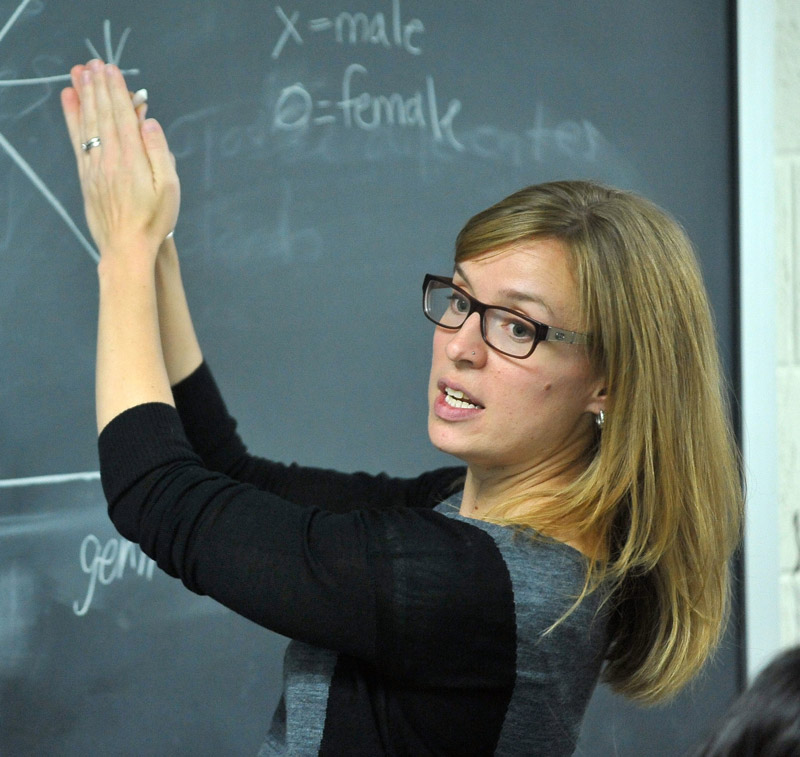Associate Professor of Psychology
Psychology and Neuroscience Department
Education
Ph.D., Drexel University
M.S., Drexel University
B.A., Gordon College
About
Main Interests
Law and Psychology, Juvenile Courts, Evidence-based practices, and Forensic Assessment.
Publications
Riggs Romaine, C.L. (2022). Functional deficits in juveniles evaluated for adjudicative competence. Criminal Justice and Behavior. doi: 10.1177/00938548221078520
Riggs Romaine, C.L., & Kavanaugh, A. (2019). To include or not to include? Complex issues in reporting race and ethnicity in forensic mental health evaluations. International Journal of Forensic Mental Health, 18(2), 138-152, doi:. 10.1080/14999013.2018.1531094
Goldstein, N. E. S, Giallella, C. L., Peterson, L., Serico, J., Kemp, K., Riggs Romaine, C., Zelechoski, A. D., Kalbeitzer, R., Kelley, S. M., Hinz, H., Sallee, M., Pennacchia, D., Prelic, A., Burkard, C., Grisso, T., Heilbrun, K., Núñez, A., Leff, S., Lochman., J. (2018). Juvenile Justice Anger Management (JJAM) Treatment for Girls: Results of a randomized controlled trial. Psychological Services. Psychological Services, 15(4), 386–397. doi: 10.1037/ser0000184
Riggs Romaine, C.L. (2018). Psychosocial maturity and risk taking: Extending our understanding beyond adolescence and delinquency. Emerging Adulthood. Advanced online publication. doi: 10.1177/2167696818768013.
Zelechoski, A.D., Wolbransky, M., & Riggs Romaine, C.L. (2018). Activities for Teaching Forensic Psychology and Psychology & Law Courses: A Guide for Instructors. American Psychological Association: Washington DC.
Riggs Romaine, C.L., Kemp, K., Giallella, C.L., Goldstein, N.E.S., Serico, J. & Kelley, S. (2017). Can we hasten development? Effects of treatment on psychosocial maturity. International Journal of Offender Therapy and Comparative Criminology. Online 11 October 2017, doi: 10.1177/0306624X17735720.
Zelechoski, A.D., Riggs Romaine, C.L., & Wolbransky, M. (2017). Teaching Psychology and Law: An Empirical Evaluation of Experiential Learning. Teaching of Psychology, 44 (3), 222-231. doi: 10.1177/0098628317711316.
Haney-Caron, E., Goldstein, N. E. S., Giallella, C., Kemp, K., & Riggs Romaine, C. (2016). Success in school for justice-involved girls: Is it just IQ, or does developmental immaturity matter? International Journal of Forensic Mental Health, 15(1), 65-80. http://dx.doi.org/10.1080/14999013.2015.1134724
Goldstein, N.E.S., Messenheimer Kelley, S., Peterson, L., Brogan, L., Zelle, H. & Riggs Romaine, C. L. (2015). Evaluation of Miranda waiver capacity. In K. Heilbrun, D.DeMatteo & N.E.S. Goldstein (Eds.) Handbook of Psychology and Juvenile Justice. Washington D.C.: American Psychological Association.
Zelle, H., Riggs Romaine, C., & Goldstein, N.E.S. (2015). Juveniles’ Miranda comprehension: Understanding, appreciation, and totality of circumstances factors. Law and Human Behavior, 39(3), http://dx.doi.org/10.1037/lhb0000116
Goldstein, N. E. S., Serico, J., Riggs Romaine, C., Zelechoski, A. D., Kalbeitzer, R., Kemp, K., & Lane, C. (2013). Development of the Juvenile Justice Anger Management (JJAM) treatment for girls. Cognitive and Behavioral Practice. 20(2), 171-188.
Grisso, T., & Riggs Romaine, C.L. (2012). Forensic evaluations in Delinquency cases. In A. Goldstein (ed.), Forensic Psychology. Volume 11 in series, I. Weiner (Ed.), Comprehensive handbook of psychology. NewYork: John Wiley and Sons.
Goldstein, N.E.S., Messenheimer, S., Riggs Romaine, C.L., & Zelle, H. (2012). Potential impact of juvenile suspects’ linguistic abilities on Miranda understanding and appreciation. In L. Solan & P. Tiersma (Eds.) Oxford handbook on linguistics and law. New York: Oxford University Press.
Riggs Romaine, C.L., Goldstein, N., Hunt, E., & DeMatteo, D. (2011). Traumatic experiences and juvenile amenability: The role of trauma in forensic evaluations and judicial decision making. Child and Youth Care Forum, 40(5) 363-380.
Riggs Romaine, C.L., & Pinals, D. (2011). Determining the likelihood of future offenses in SVP hearings. Journal of the American Academy of Psychiatry and the Law, 39, 422-424.
Goldstein, N.E., Riggs Romaine, C.L., Kalbeitzer, R., Zelle, H., Mesiarik, C., & Wolbransky, M. (2011). Psychometric properties of the Miranda Rights Comprehension Instruments-II with a juvenile justice sample. Assessment, 18(4), 428-441.
Riggs Romaine, C.L., Kemp, K., & DeMatteo, D. (2010). Forensic evaluations of juvenile competency to proceed: Applying the Dusky standard to juvenile evaluations. Journal of Forensic Psychology Practice, 10(1), 1-12.
Heilbrun, K., Goldstein, N., DeMatteo, D., Hart, A., Riggs Romaine, C., & Shah, S. (2010). Interventions in forensic settings: Juveniles in residential placement, defendants in drug courts or mental health courts, and defendants in forensic hospitals as incompetent to stand trial. In D. Barlow (Ed.), Oxford handbook of clinical psychology (pp. 649-679). New York: Oxford University Press.
Allen, S.L., Riggs Romaine, C.L., & Hoffman, K.L. (2008). Mental health in the classroom: A community service, teacher-training project. The Pennsylvania Psychologist, 68 (6), 22-23.
Kruh. I.P. & Riggs Romaine, C. (In Press). Juvenile Competence. In R. Roesch (Volume Ed.) Psychology and law, a volume of Routledge Encyclopedia of Psychology in the Real World. London: Routledge Press.
Teaching Interests
Psychology & Law, Child Psychopathology, Abnormal Psychology, Clinical Psychology & Quantitative Research Methods
Research Interests
I am a clinical psychologist who specializes in forensic work. My research focuses on questions pertaining to court-involved youth, looking at two broad areas. First, I have conducted research regarding psycholegal concepts, which includes examining youth’s general abilities (e.g., psychosocial maturity and juvenile comprehension of the Miranda warning), and how psychological information is conveyed to and used by the court (e.g., comparing the factors used by psychologists and judges to estimate risk and how trauma is considered in forensic evaluations). My current work in this area seeks to further our understanding of juvenile psychosocial maturity and its behavioral correlates, and to examine how court clinics function within the legal system and provide treatment and evaluation to court-involved youth. My second, and related, area of research is in evaluating the effect of various practices and using research to inform practice. There is a strong push for evidence based practice in juvenile justice settings, but little research on what works within this culturally diverse population with extensive histories of trauma, abuse, and neglect. Working with long-time collaborators and mentors, I am involved in projects examining the effects of treatment, and using research to inform effective teaching practices including the use of experiential learning opportunities in the classroom.
